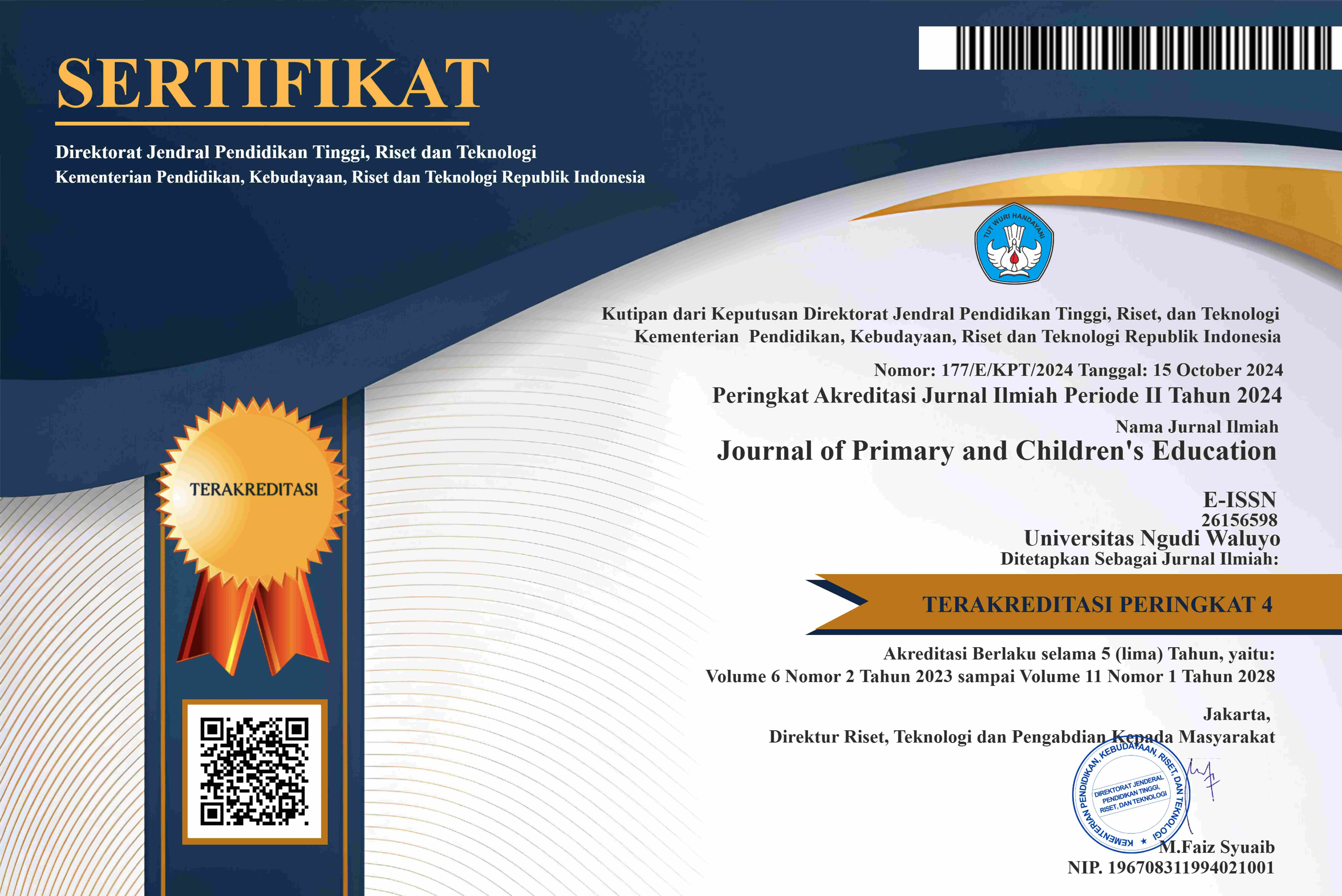MENINGKATKAN PRESTASI BELAJAR PKN KONSEP MENDESKRIPSIKAN PENGERTIAN ORGANISASI MELALUI PENERAPAN METODE SIMULASI PADA SISWA KELAS V SD NEGERI TRUKO 01 UPTD PENDIDIKAN KECAMATAN BRINGIN SEMESTER 2 TAHUN PELAJARAN 2015/2016
DOI:
https://doi.org/10.35473/jnctt.v3i1.634Abstract
The focus of research is on teacher’s effort to improve student learning achievement in Civics learning using simulation method in order to improve student learning achievement that was previously known to not as expected yet. This research was conducted on 5th grade students of Truko 01 elementary school of UPTD Education in District Bringin at second Semester in 2015/2016. The design of research using Classroom Action Research plan which stars from making the action plan, carrying out the action in learning, observing, and reflecting the action. The results of the reflection are used to make decision. The research data obtained from field notes, observations notes, planning documentation, and writing results. The instrument of collection is observation guidelines, field notes, and documentation. Data is analyzed using qualitative techniques approach, including the stages of data reduction, data exposure, verification, and data conclusions. The test validity of the data carried is carried out to re-checking (triangulation) with a colleague and students. After completing this research, the author can conclude that the Simulation Method can improve student achievement on 5th grade students of Truko 01 elementary school of UPTD Education in Bringin District in Civics Education. The average value of the learning process of students in the first cycle was 59.6 with a 58% mastery learning. The acquisition of the average value of student learning outcomes in the second cycle, which is 75 and 100% mastery learning.
References
Abu Ahmadi, 2005. Strategi Belajar Mengajar. Pustaka Setia. Bandung.
Arnie Fajar. 2004. Portofolio dalam Pembelajaran IPS. Bandung. Remaja Rostakarya.
Depdiknas.2002. Manajemen Peningkatan Mutu Berbasis Sekolah, Konsep Dasar. Jakarta : Ditjen Pendidikan Dasar dan menengah.
Dimyati dan Mudjiono, 2002. Belajar dan Pembelajaran. Jakarta. Rineka Cipta.
Fahrozi.Yusuf, 2011. http://fahrurrozi.com/kompetensi-guru-pendidikan-agamaislam/
Hilgard, ER. And Bower, G. H., 1975, Schemas Versus Mental Model In Human Memory, Chinester : John Wiley and Sons
Moleong, Lexy J. 2008. Metodologi Penelitian Kualitatif. Bandung: PT Remaja Rosdakarya.
Nana Sudjana, 2005. Dasar-Dasar Proses Belajar Mengajar. Sinar Baru Algensindo. Bandung.
Paul Suparno. 2007. Filsafat Konstruktivisme dalam Pendidikan. Yogyakarta: Kanisius.
Roestiyah, 2001. Strategi Belajar Mengajar. Rineka Cipta, Jakarta.
Shaffat, Idri. 2009. Optimized Learning Strategi. Jakarta :Prestasi Pustaka
Sanjaya, Wina. 2006. Strategi Pembelajaran Berorientasi Standar Proses Pendidikan. Bandung: Kencana.
Sardiman, 2004. Interaksi dan Motivasi Belajar Mengajar. Jakarta. Rajawali pers
Sudjana, Nana. (2016). Penilaian Hasil Proses Belajar Mengajar. Bandung: Rosdikarya
Suharsimi Arikuntoro dkk. 2007. Penelitian Tindakan Kelas. Jakarta: Bumi Aksara
Sumarsono.s, (2005) Pendidikan Kewarganegaraan. Jakarta : Gramedia Pustaka Utama.
Sutikno, M Sobry. 2009. Belajar dan Pembelajaran. Bandung: Prospect.
Slameto, 2003. Belajar dan Faktor-faktor yang Mempengaruhinya. Jakarta: Rineka Cipta.
Suryosubroto. 2002. Proses Belajar Mengajar Di Sekolah. Jakarta: Rineka Cipta
Published
How to Cite
Issue
Section
License
Copyright notice:
- Authors retain copyright and grant the journal right of first publication with the work simultaneously licensed under Creative Commons Attribution License that allows others to share the work with an acknowledgement of the work's authorship and initial publication in this journal.
- Authors are able to enter into separate, additional contractual arrangements for the non-exclusive distribution of the journal's published version of the work (e.g., post it to an institutional repository or publish it in a book), with an acknowledgement of its initial publication in this journal.
- Authors are permitted and encouraged to post their work online (e.g., in institutional repositories or on their website) prior to and during the submission process, as it can lead to productive exchanges, as well as earlier and greater citation of published work (The Effect of Open Access)







